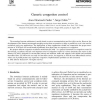Free Online Productivity Tools
i2Speak
i2Symbol
i2OCR
iTex2Img
iWeb2Print
iWeb2Shot
i2Type
iPdf2Split
iPdf2Merge
i2Bopomofo
i2Arabic
i2Style
i2Image
i2PDF
iLatex2Rtf
Sci2ools
108
click to vote
LCN
2000
IEEE
2000
IEEE
Efficient Congestion Avoidance Mechanism
The nowadays Internet architecture is mainly based on unicast communications and best-effort service. However, the development of the Internet encouraged emerging services that are sensitive to delay or packet loss, as it is the case for multimedia and group applications. The deployment of these applications should not compromise the proper transmission of TCP flows and would benefit significantly from flows that are responsive to congestion. We propose efficient congestion avoidance mechanism (ECAM) 1 as a generic framework for congestion control in the Internet, to address this lack and important need of congestion control in various situations that occurs in the Internet. ECAM is designed for uncontrolled unicast and multicast traffic and supports both reliable and unreliable best-effort flows. ECAM works not only for best-effort service, but supports as well the new differentiated services, where out of profile packets may experience congestion. Implementation problems are also di...
Computer Networks | Congestion Avoidance Mechanism | Congestion Control | LCN 2000 | Nowadays Internet Architecture |
Related Content
| Added | 25 Aug 2010 |
| Updated | 25 Aug 2010 |
| Type | Conference |
| Year | 2000 |
| Where | LCN |
| Authors | Anca Dracinschi Sailer, Serge Fdida |
Comments (0)

